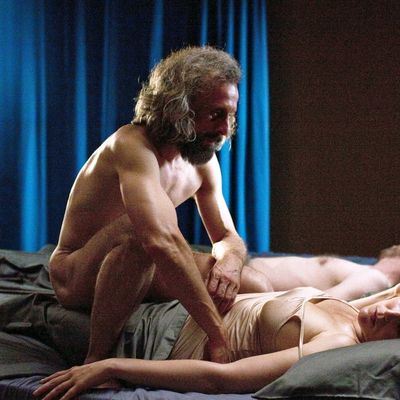
Alex Van Warmerdam’s Borgman begins in a manner so weird that it immediately sets an impossible task for itself: to somehow sate our narrative curiosity while keeping the weirdness going. It opens as a trio of men, led by a priest wielding a rifle, attacks a bearded, scruffy vagrant hiding out in a literal hole in the ground. The vagrant, whom we will soon know as Camiel Borgman (Jan Bijvoet), escapes and warns two others, who are also in their own little holes. “I’m trying to sleep,” one of them complains. “Why don’t you pick up the phone?” Borgman scolds him. The weird mix of desperation and nonchalance doesn’t quite peg the men as fugitives; they seem comfy in their little holes. At any rate, soon Borgman comes to a home in a posh neighborhood. A man answers the door. Borgman tells the man he knows his wife, and that she was his nurse once. The man is perplexed; his wife is not a nurse. When the wife, Marina (Hadewych Minis), appears, Borgman continues to insist he knows her. The husband, increasingly agitated, beats Borgman right there on the lawn. And now the wife feels guilty. Soon enough, Borgman is sitting in her bathtub, contentedly eating soup and drinking a glass of red wine.
We still have no idea where this story is going. But it appears that this scruffy guest might be staying a while, brutish husband be damned. Borgman feeds on Marina’s guilt like a parasite. When she tries to get rid of him, he asks, “Some soup, a night’s sleep, and the damage is bought off?” But then, after she consents to take further care of him, he tells her to make peace with her husband: “It was to protect you. It should be praised.” Even when Borgman says the wrong things, he’s saying all the right things, pushing all the right buttons.
And it all happens so quickly, the point-counterpoint of overreaction feeding on itself. The movie is, at least for its first half, a self-sustaining dynamo of weirdness, as if David Lynch remade Down and Out in Beverly Hills — part comedy of manners, part surrealist fable. As Borgman insinuates himself into this family’s life, moments of potential horror are undercut by the deadpan oddness of the characters’ interactions. Like Lynch, Van Warmerdam understands something basic about surrealism. He knows that in order to draw us in, his images and storytelling need to be clear — otherwise we’ll just assume we’ve lost the thread somewhere along the way, and start to drift away from the film. But even as he delivers his story in precise strokes, the director undermines his pleasant, bourgeois setting and antiseptic imagery with subtle touches, like the buzzing of flies on the soundtrack.
He does occasionally tip his hand a bit too much; at one point early on, the music from a monster movie on TV plays as Borgman packs his bags. But even then, the film doesn’t quite let go of its sense of offbeat fun. It’s all somehow both ominous yet delightful, and you wonder how long this directorial magic act can continue — how long the film can hover on the slippery, uncertain edge between suspense and absurdity.
Quite long, it turns out … but maybe still not long enough. Borgman eventually does fall to one side of that divide, and I can’t help but think that it loses something in the process. It’s not so much that the film abandons surrealism (if anything, it becomes even more strange) but that it becomes a bit more generic and predictably cruel in its strangeness. Gone is the intoxicating feeling of not knowing where the story is going, and yet feeling like you’re in impeccably assured hands. Still, you can’t help but admire the movie for what it does right. Van Warmerdam has a way with images that are both playful and horrific, and you may find yourself chuckling at Borgman as much as you recoil at it. It’s destined for cult status.





